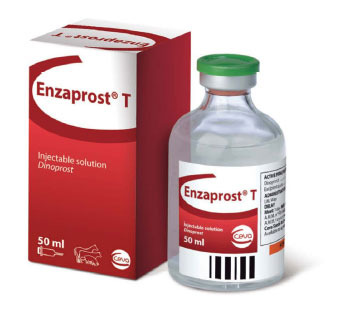Enzaprost
Mechanism of Action:
Luteolysis: Enzaprost causes luteolysis by breaking down the corpus luteum, which is essential for maintaining pregnancy. Once the corpus luteum is destroyed, progesterone production stops, and the animal enters the next phase of its reproductive cycle.
Uterine contractions: The drug stimulates the smooth muscle in the uterus, leading to contractions that help in expelling fetal membranes, resolving uterine infections, or inducing parturition.
Potential Side Effects:
Uterine contractions: Excessive contractions can sometimes lead to discomfort or complications, especially if labor is induced prematurely or improperly.
Abortion: If not used correctly or if given to a pregnant animal without proper guidance, it can induce abortion.
Mild discomfort at the injection site: There may be localized swelling or irritation.
Fever and general discomfort: Some animals may show temporary signs of fever or malaise following injection.
Precautions:
Pregnancy: enzaprost rcp should not be given to pregnant animals unless abortion or parturition induction is intended.
Handling: Pregnant women or women trying to conceive should handle this drug with care. Accidental exposure can cause abortion in humans.
Lactation: Use in lactating animals should be supervised by a veterinarian to ensure it does not adversely affect milk production or quality.
Health status: Only use Enzaprost in animals that are in good health and under veterinary supervision, as uterine contractions may pose a risk in weak or sick animals.
Withdrawal Period:
Meat withdrawal: Depending on local regulations, animals treated with Enzaprost may have a specified withdrawal period before their meat can enter the food supply. For instance, there is typically a 1–2 day withdrawal period for cattle and swine.
Milk withdrawal: For dairy cattle, Enzaprost may have a short withdrawal period (if any) depending on regulations, typically ranging from 0 to 2 days.
Contraindications:
Pregnant animals (unless inducing labor/abortion): Should not be used in pregnant animals unless labor or abortion is the goal, as it can cause uterine contractions and expulsion of the fetus.
Known sensitivity: Animals allergic to prostaglandin products should not be treated with Enzaprost.
Severe uterine infections or damage: Caution is required when using this product in animals with compromised reproductive health.
enzaprost rcp is a powerful prostaglandin-based drug widely used in veterinary medicine for managing reproductive health, including estrus synchronization, inducing parturition, and treating uterine infections. Its ability to regulate the reproductive cycle and induce uterine contractions makes it an essential tool in livestock and equine reproductive management.
However, it must be used carefully under veterinary supervision to avoid complications such as abortion or improper use during pregnancy. Proper dosing and adherence to withdrawal periods ensure its safe use in food-producing animals.
Enzaprost rcp
Enzaprost (also known as Enzaprost RCP) is a synthetic analogue of prostaglandin F2α (PGF2α), primarily used in veterinary medicine to manage reproductive issues in animals. Its primary role is in regulating estrous cycles, inducing labor, and managing uterine health in livestock, such as cattle, pigs, and horses. enzaprost rcp
Key Information about Enzaprost (Enzaprost RCP):
Active Ingredient:
Cloprostenol: A synthetic prostaglandin analogue, specifically a form of PGF2α, which acts on the smooth muscle of the uterus and luteal tissue in the ovaries, causing luteolysis (the breakdown of the corpus luteum) and stimulating uterine contractions.
Uses/Indications:
Enzaprost is mainly used in large animals for various reproductive and uterine health management purposes. The most common uses include:
Inducing estrus (heat) in cattle and horses: It helps to synchronize estrus in females for timed breeding or artificial insemination.
Luteolysis: Causes the breakdown of the corpus luteum (a hormone-secreting structure formed in the ovary) to return an animal to estrus, which is useful in managing estrous cycles in livestock.
Inducing parturition (labor): Enzaprost can be used to induce labor in certain animals, especially swine and cattle, if parturition needs to be timed for specific reasons.
Treatment of pyometra (uterine infection with pus) in cattle and horses.
Termination of pregnancy: Used to induce abortion in animals by causing luteolysis, thus terminating the pregnancy.
Uterine evacuation: Used post-parturition to clean out any retained fetal membranes or assist in uterine involution (the return of the uterus to its pre-pregnancy size).
Species of Use:
Cattle (Bovine): Commonly used for estrus synchronization, treatment of uterine infections (such as pyometra), or induced labor.
Swine (Porcine): Often used to induce farrowing (labor) at a precise time for management purposes.
Horses (Equine): It can synchronize estrus and help resolve reproductive abnormalities, including prolonged luteal activity.
Dosage and Administration:
The dosage of Enzaprost varies based on the species and the indication for its use. The injection is usually given intramuscularly (IM).
Cattle: For estrus synchronization, the typical dose is 500 µg of cloprostenol administered intramuscularly. Animals usually return to estrus within 2-5 days. enzaprost rcp
Swine: To induce farrowing, a dose of 175 µg of cloprostenol is injected IM, typically inducing labor within 36 hours.
Horses: Similar to cattle, a dose of around 250-500 µg can be used for estrus synchronization.
Note: Doses must be prescribed by a veterinarian depending on the specific animal’s condition and species.




Reviews
There are no reviews yet.